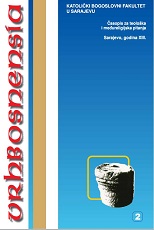PORUKA I TUMAČENJE PRISPODOBE O UDOVICI I SUCU (Lk 18,1-8)
THE MESSAGE AND INTERPRETATION OF THE PARABLE ABOUT THE WIDOW AND THE JUDGE (LUKE 18:1-8)
Author(s): Darko TomaševićSubject(s): Christian Theology and Religion
Published by: Katolički bogoslovni fakultet
Keywords: persistent prayer; faith; God’s kingdom; eschatology; securing justice
Summary/Abstract: Luke places the parable about the widow and the judge in the central part of his Gospel. Because this parable is peculiar to Luke, it must have been of major significance to him, so much so that he did not want to leave it out. We must ask ourselves what is the message of this parable and how should we interpret it – in other words, what does this parable mean? It is clearly filled with meaning – and themes that it touches on are God’s kingdom, eschatology, and securing justice, with a principal theme being the bond between prayer and faith. This parable speaks about securing justice but it also invites us to be instruments of divine justice – the justice associated with the kingdom of God. God will dispense justice especially during the parousia. Believers are encouraged to pray for the coming of the Lord. But we cannot pray if we do not have faith, and we will lose faith if we do not pray. Prayer and faith are intimately connected. Thus, four main themes are inter-woven in this parable: the theme of prayer, the theme of securing justice, the theme of eschatology and the theme of faith. The parable teaches four things: it teaches that we have to pray always and to be persistent in praying; to believe that God will answer persistent prayer and that He will grant justice to His chosen ones (especially during the parousia); and that in order to be able to pray and secure justice people must keep faith. We are people of this world, but at the same time our true home is in heaven. Therefore our prayers should not be only earth oriented but very much heaven oriented. In this parable Jesus wants to encourage His disciples while explaining that it is not easy to follow God. People can become weary of asking all the time. When things do not happen on time, people worry, doubt, question. Delay erodes our ability to believe. But even when a prayer is not answered immediately man has to pray and have faith. Prayer is a privilege that humans should not disregard. One of the problems with us is that we may expect too much. If our prayer is not answered we become disappointed. But the parable teaches that in seeking justice, there is no place for weariness and that we should not lose courage. This parable underscores the paradoxical power of seeming weakness and stresses that life demands persistence.
Journal: Vrhbosnensia
- Issue Year: 2009
- Issue No: 2
- Page Range: 229-258
- Page Count: 30
- Language: Croatian

